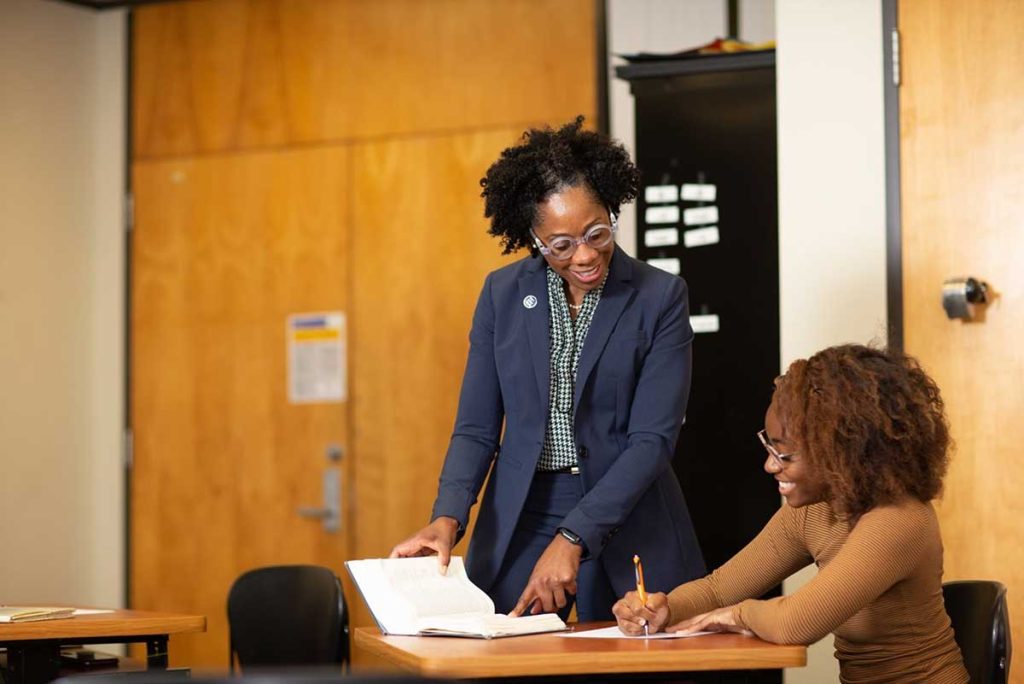By Sarah Padyk
For Dr. Tanya Hudson, an associate professor, researcher, and chair in the College of Education at Fayetteville State University, an unexpected career path arose from a love for mathematics.
Born and raised in Canada, Hudson began her education by studying statistics at Dalhousie University. Initially planning to be a pharmacist, she soon realized that she wanted a career that allowed her to make close connections with people. She went back to school to study education, and shortly after, Hudson moved to North Carolina and began teaching.
After starting her career in education as a math instructor, colleagues who felt she would be a good assistant principal encouraged her to go to graduate school. This motivated Hudson to get a master’s degree from Gardner-Webb University. She became an assistant principal shortly after, but eventually left that position and returned to Gardner-Webb to earn her doctoral degree in education.
“I wasn’t going to do it because I was a good math teacher,” said Hudson. “I build very strong relationships with my students, and I have an open-door policy where they get to know me, and I get to know them, and I get to know their parents. That level of respect just kind of carried throughout my journey.”
After earning her doctorate, she transitioned to higher-level education and became a Fayetteville State University (FSU) professor.

“Now I’m working towards something that’s a bigger goal because I get to work with students that are studying to be educators, but they look like me, and I didn’t see that growing up, and it’s really, really important,” said Hudson. “I think that being in this particular position, I am able to help more students get through the program and support them along the way.”
Along with teaching at FSU, Dr. Hudson also conducts research. Recently, she received funding from the North Carolina Policy Collaboratory as a part of its Historically Minority-Serving Institutions (HSMI) Research Grant Program. She conducted a grassroots study on how COVID-19 has affected learning loss in Black and Brown students in the Sandhills Region of North Carolina. Hudson and her colleague went door-to-door in these communities and spoke with affected families and educators.
“Wherever there were people, we were trying to get to people,” said Hudson. “We were trying to get to the voices of the families that nobody would ever talk to.”
Hudson said that the stories she heard while conducting these interviews deeply impacted her. She heard from parents and teachers about the setbacks and systemic failures that impacted the children in these communities, both academically and socially.
“It has definitely made me more passionate about teaching because I want my students to realize that there’s a bigger calling on teachers,” said Hudson. “It helped me realize how much I want to make sure my students are ready; and that they’re empathetic to dealing with the whole child, not just the academics, because that’s what I was seeing more than anything.”
Dr. Hudson is now working on another research proposal that she says will have an even larger impact on students. She remains passionate about highlighting the educational disparities of local communities whose stories are often overlooked.
“My favorite part of this research was being able to say that I am trying to let the truth be told and talking to the people that matter,” said Hudson.
For more information about current HMSI projects, visit the Collaboratory’s HMSI webpage.
Sarah Padyk is a graduate student at the UNC Hussman School of Journalism and Media and is an environment and science communication dual degree student. She graduated with a BS in environmental science from UNC-Chapel Hill in May and is currently working towards an MA in media and communication. She is a communications intern with the Collaboratory for the 2022 fall semester.
